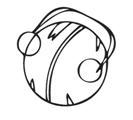All the madmen has quite a long subtitle as you can see and this version has two more drawings on the front than mine. This review is the result of a chance meeting between this book and myself at Dublin airport on route to New York. Exactly the right sort of airplane book, with a lot of my favourite artists from the time I started to discover music that are discussed.
Basically I'm to young to really know the music that is analysed (together with its creators). I knew the 45s from the radio and possessed a few of them myself, but albums were far beyond me and my financial means at the time. Acts like The Kinks, The Who, David Bowie and Pink Floyd did become my favourites album acts from the mid-70s onwards. So, a book to read.
The book takes it title from David Bowie's 1970 song All the madmen on 'The man who sold the world'. The album's title track being best known in 2012 for Nirvana's cover on the legendary MTV unplugged session.
Heylin starts from a premisse that there is a long tradition of madness in the UK "due to the freedom of mind" enjoyed there, as other countries pointed out in those days. Undoubtedly implicitly implicating that freedom of expression, etc., was not for them. Thus he goes out to show that a lot of the greatest artist of the 1965 - 1975 British rock era suffered from depression, deeply felt insecurities and nervous breakdowns. The term schizophrenia is all over this book. Mind, these were the days before media training as most of these guys spilled their guts in interviews! No holding back here.
The book focusses on a number of pivotal acts of this era, following their careers or demise through the years. David Bowie, who's half brother Terry and lots of family members on his mother's side were diagnosed with schizophrenia. Mr. Bowie new exactly how to use this. Despite all the drugs and all the madness surrounding his life, he came out all right as a great commercial pop star in the 80s. Ray Davies lived to tell, although his hit-writing career was over in 1970. Pete Townsend lived to tell and was even able to enjoy how good his music was. Others were less fortunate. Firstly Nick Drake of course, who sank away in deeper and deeper depression and most likely took his life in 1974. It would take all the way up to 2000, when a Volkswagen commercial in the US made his albums finally soar. Peter Green and Syd Barrett lived, but were singed by the fire they courted called LSD and couldn't cope, one way or another.
The conclusion of this book is what Richard Ashcroft taught us years ago: "The drugs don't work". Perhaps fleetingly, but not on an every day basis. The term "self-medication" which Heylin refers to regularly, is a nice one, whether drugs, booze or whatever.
The research for this book is fantastic. There appears to be so much interviews about to cull information from. Implicitly the book also shows how tedious being interviewed must be if reporters still try to discuss points from 10, 20, 40 years back again and again and again. Most artists happily discuss their doubts, their (failed) plans, their neuroses and what not, except for those that did not make it. There is a lot less material on them. What does that distinction tell us? I can't remember Heylin addressing this question, except where Bowie is concerned. Because he found Bowie lacking of sincerity?
The book starts of with a discourse on anti-psychiatry and Syd Barrett almost making an appointment with the leader of this 1960s failed psychiatry form, one Robert Laing. I didn't get this bit really, but the rest of the story line is well thought out. Except that Heylin may have overseen some of the most obvious: it's lonely at the top. The pressure is enormous to deliver the goods time and again and who can you trust once at the top. The other one is, that people who are very talented set everything aside in order to create, most likely obsessed. Just read about Townsend and Davies and pushing human boundaries and as everyone is insecure .... (There's a great anecdote on "big feet" in here.) They have to be a bit crazy, otherwise nothing would ever happen and everything would distract them. Look at all art (let's start with Pablo Picasso or Vincent van Gogh), politicians, business tycoons, writers, etc. And, yes, also pop stars. Perhaps very creative people are just more sensitive than the "average" people, exactly the reason why they can be so productive, creative and function perfectly well as long as something or other doesn't push them over the edge.
Yes, I am a bit sceptic here, just as I was on the psychiatry intro, but still it's a great book and one hell of a reconstruction of the life of some very creative people that helped change the face of music. Well worth the read.
Wo.
You can order All the madmen here





Geen opmerkingen:
Een reactie posten